Libraries & Technologies in the New Millennium
₹795.00
Shishir H Mandalia, Ram Chander| Category: Library & Information Science
Binding Type: Hard Binding
Book DetailsISBN: 9789386221834
YOP: 2018
Pages: 573Order also on
The Beginning of the 21st Century has been called Information Age because of the explosion of information output and information sources. It has become increasingly clear that students cannot learn everything they need to know in their field of study in a few years during stay in the college. To meet the needs of student, we must provide them some latest technology and this can be automated system in the library. The human element is a very important aspect in implementing the automated system in the library. The library and its staff are the focal point and play a very important role in the process of library automation.
During the automation process, it is crucial for the library to assure a coordinating role to be aware what is going on globally at all times competence, staff awareness and participation are crucial for the success of the new system or services. Beside this, it is also equally necessary that the library staff should computer literate and professionally experienced, involvement of staff that will be affected at all levels in the new system/service is a prerequisite for the successful implementation of the automation process.
This book will also provide a prospect to make out the strengths and weakness of library automation system and to suggest new open source software management tool in electronic environment, programs for redesigning libraries into next generation libraries for development of education system. The theme has been further divided into three sub themes, to enable the professionals to present their ideas, experiences. The Library professionals have also made fresh research studies in this and related areas. This volume consists of paper written by the professionals, and discussion on these papers written by the professionals, and the various discussions on different issues are likely to provide an opportunity and platform for sharing their experience and ideas.
1. Libraries of the Future: Cloud Computing to Fog Computing
2. The Concept of Plagiarism and Anti-Plagiarism Software
3. Plagiarism: Causes, Effects and Prevention
4. Plagiarism and Researchers: A Survey of PhD Students
5. Radical Switch in the Role of Librarians in the
6. Digital Footprint: A Changed Panorma
7. Library and Information Services through Intranet in Present Scenario
8. Digital Libraries: A Comprehensive Study
9. Library Automation: Issues and Challenges
10. Library Automation: An Overview
11. The Role of Digital Library in Present Scenario
12. Management of Library in New Digital Environment
13. Use of Mobile Technology as a New Emerging Phase in
14. Automated Academic Libraries: An Overview
15. Use of RFID Technology in Libraries, its Components and Benefits
16. Cloud Computing: Distributed Internet Computing for it Free and Open Source Software
17. Changing Role of Librarians in Digital Library Era and Need of Professional Skills, Efficiency and Competency
18. Collection Development of Academic Libraries in ICT Based Environment: Issues and Challenges
19. Copyright Infringement in India
20. The Changing Shape of Collection in Libraries in Electronic Age
21. Models of Information Seeking Behaviour
22. Evaluation of Information Literacy Program in College Libraries of Uttar Pradesh: A Study
23. Transmuting Libraries in Electronic Environment
24. Libraries of the Future: Cloud Computing to Fog Computing
25. Role of Library Personnel in New Digital Environment
26. Total Quality Management in College Libraries: A LIS Perspective Approach
27. Role of Total Quality Management in Academic Library
28. A Perspective and Advantages of Open-Sources
29. Role of Social Networking in Digital Era: An Overview
30. Necessity of Multilingual Supportive Functional Model to Effective Online Information Seeking for Academicians
31. Security and Privacy Challenges in Cloud Computing
32. Role of Information Technology in Libraries
33. Challenges and Issues: Migration to Open Source Software
34. Marketing Strategies for Virtual Resources in Electronic Commerce
35. Role of Library Professionals in Today’s Globalized Era
36. Internationalization and Curriculum Development Programmes of Library and Information Science Education
The Beginning of the 21st Century has been called Information Age because of the explosion of information output and information sources. It has become increasingly clear that students cannot learn everything they need to know in their field of study in a few years during stay in the college. To meet the needs of student, we must provide them some latest technology and this can be automated system in the library. The human element is a very important aspect in implementing the automated system in the library. The library and its staff are the focal point and play a very important role in the process of library automation.
During the automation process, it is crucial for the library to assure a coordinating role to be aware what is going on globally at all times competence, staff awareness and participation are crucial for the success of the new system or services. Beside this, it is also equally necessary that the library staff should computer literate and professionally experienced, involvement of staff that will be affected at all levels in the new system/service is a prerequisite for the successful implementation of the automation process.
This book will also provide a prospect to make out the strengths and weakness of library automation system and to suggest new open source software management tool in electronic environment, programs for redesigning libraries into next generation libraries for development of education system. The theme has been further divided into three sub themes, to enable the professionals to present their ideas, experiences. The Library professionals have also made fresh research studies in this and related areas. This volume consists of paper written by the professionals, and discussion on these papers written by the professionals, and the various discussions on different issues are likely to provide an opportunity and platform for sharing their experience and ideas.
1. Libraries of the Future: Cloud Computing to Fog Computing
2. The Concept of Plagiarism and Anti-Plagiarism Software
3. Plagiarism: Causes, Effects and Prevention
4. Plagiarism and Researchers: A Survey of PhD Students
5. Radical Switch in the Role of Librarians in the
6. Digital Footprint: A Changed Panorma
7. Library and Information Services through Intranet in Present Scenario
8. Digital Libraries: A Comprehensive Study
9. Library Automation: Issues and Challenges
10. Library Automation: An Overview
11. The Role of Digital Library in Present Scenario
12. Management of Library in New Digital Environment
13. Use of Mobile Technology as a New Emerging Phase in
14. Automated Academic Libraries: An Overview
15. Use of RFID Technology in Libraries, its Components and Benefits
16. Cloud Computing: Distributed Internet Computing for it Free and Open Source Software
17. Changing Role of Librarians in Digital Library Era and Need of Professional Skills, Efficiency and Competency
18. Collection Development of Academic Libraries in ICT Based Environment: Issues and Challenges
19. Copyright Infringement in India
20. The Changing Shape of Collection in Libraries in Electronic Age
21. Models of Information Seeking Behaviour
22. Evaluation of Information Literacy Program in College Libraries of Uttar Pradesh: A Study
23. Transmuting Libraries in Electronic Environment
24. Libraries of the Future: Cloud Computing to Fog Computing
25. Role of Library Personnel in New Digital Environment
26. Total Quality Management in College Libraries: A LIS Perspective Approach
27. Role of Total Quality Management in Academic Library
28. A Perspective and Advantages of Open-Sources
29. Role of Social Networking in Digital Era: An Overview
30. Necessity of Multilingual Supportive Functional Model to Effective Online Information Seeking for Academicians
31. Security and Privacy Challenges in Cloud Computing
32. Role of Information Technology in Libraries
33. Challenges and Issues: Migration to Open Source Software
34. Marketing Strategies for Virtual Resources in Electronic Commerce
35. Role of Library Professionals in Today’s Globalized Era
36. Internationalization and Curriculum Development Programmes of Library and Information Science Education
| yop |
2018 |
|---|---|
| subject-category |
Library & Information Science |
| isbn |
9789386221834 |

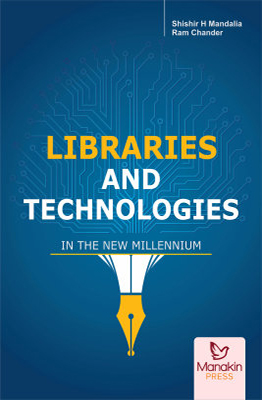

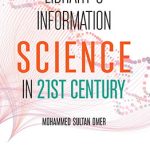
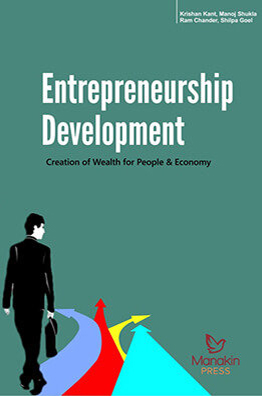
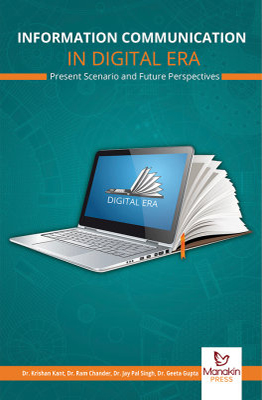
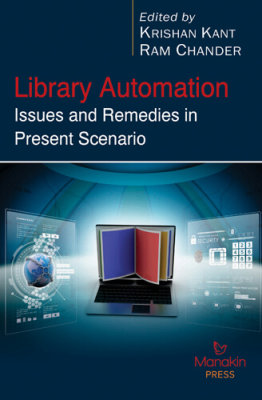
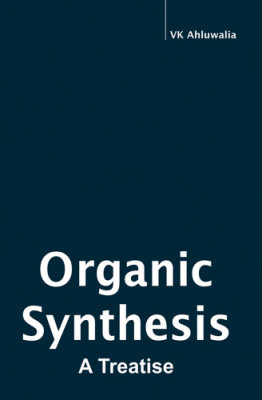
Reviews
There are no reviews yet.